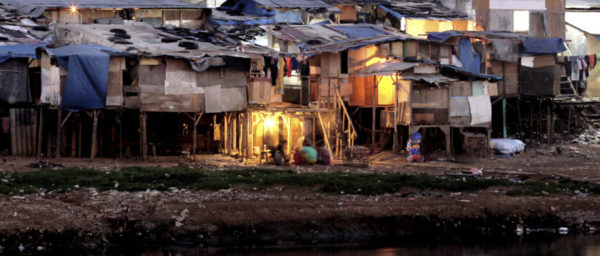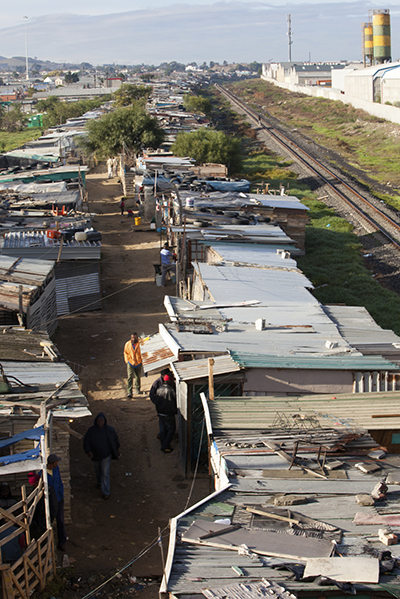Supporting bottom-up community upgrading in South Africa’s informal settlements
Community-led Upgrading for Self-Reliance in South Africa: Integrated Construction and Environmental Management Systems in Informal Settlements, a three-year project jointly funded by the ESRC and Newton Fund, seeks to promote a better understanding of bottom-up improvements to informal settlements. While focusing primarily on Durban, the findings will also provide important insights into the challenges and opportunities of community-led upgrading elsewhere. An interview with Maria Christina Georgiadou, the UK Principal Investigator of the research, discusses the current barriers to adequate housing in South Africa, its difficult legacy of inequality and the potential benefits of a more community-focused approach to these issues.

What do you see as the distinct challenges facing South Africa with regards to informal settlements, particularly in relation to its history of apartheid and inequality?
Migration, poverty and slum eradication all have major roles in the continued existence of informal settlements in many African countries, including South Africa. Those living in informal settlements typically cannot afford to build or buy their own houses, or cannot access formal housing schemes. The post-apartheid period offered a number of top-down strategies to informal settlement upgrading without, however, engaging directly with low-income communities. These approaches have not understood, in depth, the nature of vulnerability due to the impacts of unique local contexts. Top-down models are also unsustainable in that they perpetuate the legacy of Apartheid in housing delivery – many informal settlements remained in gated communities in urban peripheries without social integration and far from urban opportunities.
The South African government in the last two decades has made land and housing a central priority, yet these issues have yet to be resolved. Why do you think that is?
Since the end of the Apartheid system in 1994, there have been important changes in the policy landscape surrounding informal settlement upgrading in South Africa, with a number of important top-down initiatives to develop housing, infrastructure and environmental improvements. But while most South African municipalities have the capacity to provide basic services, few have explored alternative means of housing provision, such as inclusive participatory planning through community empowerment.
And what do you hope the outcomes of the Community Led Upgrading project will be?
The overarching aim of this research is to develop and test an integrated “collaborative environmental and construction management” toolkit to enhance community self-reliance in informal settlements in Durban. This will be a dynamic decision-making tool that will help identify the role of different beneficiaries and stakeholders, the skills and resources required to support their activities and appropriate business models to realise their objectives. We seek practical recommendations and ‘triple-win’ solutions that systemically increase local economic growth, community participation and environmental sustainability.
In what way will this differ from previous methods applied to informal settlements in South Africa?
Previous studies on in-situ upgrading of informal settlements in Durban have explored the impact of community participation on local inhabitants. However, we seek to engage with community members as grassroots co-researchers – not just as objects of study – throughout the process. Sharing information, and delivering training, with community researchers on these topics helps to ensure the project lives up to its ambitious plans for inclusive and community-led research. We will foster a collaborative learning environment, where academic knowledge gained will be blended with indigenous knowledge to drive change, mutual learning and broader dissemination. This will ensure local ownership before the toolkit is taken-up by community organisations and municipal officers.

What do you anticipate will be the primary challenges to overcome as the project progresses?
Undertaking research from a ‘real-world’ perspective poses a number of risks, since little control is possible. For example, during this first field trip, a primary challenge was to secure participation of the community, as access to some case study areas was delayed, due to the uncertain political environment in South Africa at the time. However, the project team secured close collaboration with uTshani Fund and FEDUP, and by working closely with these partners established a relationship with the case study communities.
Do you think your project findings will have important implications for cities elsewhere in South Africa and the region more broadly?
We hope to produce a robust collaborative toolkit relevant beyond Durban metropolitan area. For instance, we have already established strong links with the eThekwini Municipality and uTshani Fund (the South African SDI Alliance), which offers a better understanding of the critical factors affecting bottom-up upgrading and the barriers facing top-down approaches to date. We also seek to explore the limitations of the existing municipality-led approaches via in-depth interviews and focus groups with policy-makers and municipal officers involved in participatory upgrading with local communities. Once we consolidate findings from Durban and the wider KwaZulu-Natal province, cross-comparison with other South African or wider African cities will be embedded towards the end of the project as part of our knowledge transfer activities. More broadly, however, our established networks with leading urban organisations worldwide will also offer significant knowledge transfer opportunities in Africa, Asia and Latin America.